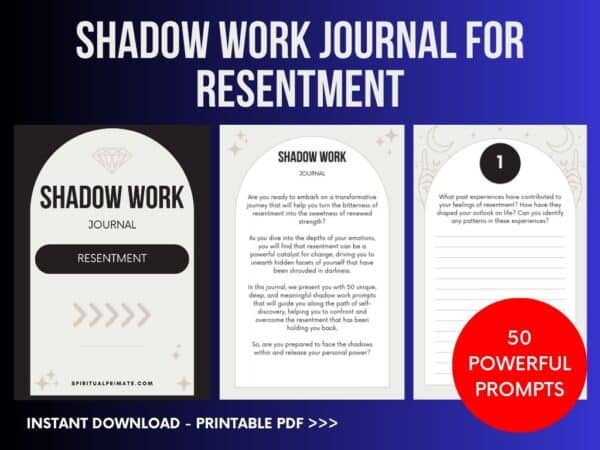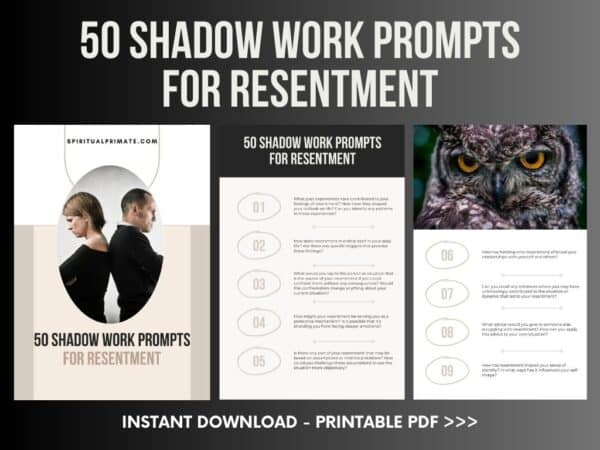Are you ready to embark on a transformative journey that will help you turn the bitterness of resentment into the sweetness of renewed strength?
As you dive into the depths of your emotions, you will find that resentment can be a powerful catalyst for change, driving you to unearth hidden facets of yourself that have been shrouded in darkness.
In this guide, we present you with 50 unique, deep, and meaningful shadow work prompts that will guide you along the path of self-discovery, helping you to confront and overcome the resentment that has been holding you back.
So, are you prepared to face the shadows within and release your personal power?

Understanding Resentment
Resentment is a complex and powerful emotion that arises when someone feels wronged, unfairly treated, or hurt by another person’s actions or words. It’s a mixture of anger, disappointment, and a sense of injustice that can linger in the mind and heart for a long time.
Imagine a situation where a friend betrays your trust or a coworker receives the promotion you believe you deserved. These experiences can leave you feeling resentful because you think you were treated unfairly or that others didn’t give you the respect you deserved.
Resentment can be harmful, not only to relationships but also to your mental and emotional well-being. It can consume your thoughts and prevent you from enjoying life or moving forward. However, it’s important to remember that resentment is a natural human emotion, and everyone experiences it at some point in their lives.
To overcome resentment, it’s essential to acknowledge your feelings, understand why you feel resentful, and work towards forgiveness and letting go. By doing so, you can transform resentment into renewed strength and a deeper understanding of yourself and others.

Shadow Work: Transforming Resentment into Renewed Strength
Resentment is a complex and powerful emotion that arises when someone feels wronged, unfairly treated, or hurt by another person’s actions or words. Although it is a natural human emotion, resentment can be harmful to relationships and mental and emotional well-being. One effective way to overcome resentment and transform it into renewed strength is through shadow work. Shadow work is a self-reflective process that encourages individuals to examine their unconscious beliefs, patterns, and feelings that may be influencing their thoughts and actions.
How Shadow Work Helps with Resentment
1. Acknowledging Feelings
The first step in shadow work is acknowledging and accepting the emotions one is experiencing, including resentment. By recognizing the emotion, individuals can begin to understand its roots and work towards resolving it. As resentment is often suppressed or denied, bringing it to the surface allows for a deeper understanding of oneself and the situation.
2. Identifying Triggers
Shadow work helps individuals identify the triggers that cause feelings of resentment. By examining situations and interactions that provoke resentment, one can gain insight into the underlying issues and patterns that contribute to these negative emotions. This awareness can lead to a better understanding of personal boundaries, needs, and values.
3. Uncovering Unconscious Beliefs
Through shadow work, individuals can uncover unconscious beliefs and patterns that contribute to resentment. These beliefs may include feelings of unworthiness, fear of abandonment, or the need for control. By bringing these unconscious beliefs to the surface, individuals can address them and work towards changing them, ultimately reducing feelings of resentment.
4. Cultivating Empathy and Compassion
Shadow work encourages the cultivation of empathy and compassion for oneself and others. By developing a deeper understanding of one’s own emotions and the emotions of others, individuals can begin to see different perspectives and develop a more compassionate approach. This empathy can lead to a greater capacity for forgiveness, which is essential for overcoming resentment.
5. Developing Forgiveness and Letting Go
Forgiveness is a crucial aspect of transforming resentment into renewed strength. Through shadow work, individuals can develop the ability to forgive themselves and others, allowing them to let go of past hurts and move forward with their lives. Forgiveness is a powerful tool for healing, as it releases the emotional burden of resentment and opens the door for personal growth and healthier relationships.
Shadow work is an effective method for transforming resentment into renewed strength. By acknowledging feelings, identifying triggers, uncovering unconscious beliefs, cultivating empathy and compassion, and developing forgiveness, individuals can overcome resentment and improve their emotional well-being. Through this process, they can create healthier relationships, increase self-awareness, and foster personal growth, turning resentment into an opportunity for positive transformation.

Shadow Work Prompts for Resentment
1. What past experiences have contributed to your feelings of resentment? How have they shaped your outlook on life? Can you identify any patterns in these experiences?
2. How does resentment manifest itself in your daily life? Are there any specific triggers that provoke these feelings?
3. What would you say to the person or situation that is the source of your resentment if you could confront them without any consequences? Would this confrontation change anything about your current situation?
4. How might your resentment be serving you as a protective mechanism? Is it possible that it’s shielding you from facing deeper emotions?
5. Is there any part of your resentment that may be based on assumptions or misinterpretations? How could you challenge these assumptions to see the situation more objectively?
6. How has holding onto resentment affected your relationships with yourself and others?
7. Can you recall any instances where you may have unknowingly contributed to the situation or dynamic that led to your resentment?
8. What advice would you give to someone else struggling with resentment? How can you apply this advice to your own situation?
9. How has resentment shaped your sense of identity? In what ways has it influenced your self-image?
10. How might your life be different if you were able to release your resentment? What would it feel like to be free of its grip?
11. Can you identify any opportunities for growth and self-improvement that have arisen from your experiences with resentment?
12. How has resentment affected your ability to trust others and form meaningful connections?
13. Can you think of any positive aspects or lessons that have come from your experiences with resentment?
14. How might your resentment be connected to your core beliefs and values? Are there any contradictions or inconsistencies between them?
15. In what ways have you unconsciously allowed resentment to hold power over you?
16. How has resentment influenced your decision-making and actions in various areas of your life?
17. What steps can you take to cultivate forgiveness and compassion for those who have contributed to your resentment?
18. How might your resentment be a reflection of unmet needs or unfulfilled desires? How can you work towards meeting these needs in a healthy way?
19. In what ways have you attempted to cope with or manage your resentment in the past, and how effective have these strategies been?
20. How has resentment impacted your overall well-being, both physically and mentally?
21. What are some empowering affirmations or mantras that can help you release resentment and embrace forgiveness?
22. What role does your inner critic play in perpetuating your feelings of resentment?
23. How might your resentment be connected to past traumas or unresolved issues from your childhood?
24. How can you use your experiences with resentment as a catalyst for personal growth and transformation?
25. What would it look like to practice radical acceptance of the situation or person that is causing your resentment?
26. How has resentment affected your ability to communicate effectively with others?
27. Can you identify any limiting beliefs that may be fueling your resentment? How can you challenge and reframe these beliefs?
28. How has resentment influenced your perception of control and agency in your life?
29. What underlying fears or insecurities might be driving your feelings of resentment?
30. How might your resentment be a reflection of your own self-judgment or feelings of unworthiness?
31. What role does shame play in perpetuating your resentment? How can you work to release shame and cultivate self-compassion?
32. How has resentment affected your ability to be present and enjoy the present moment?
33. Can you find any examples of times when you have successfully let go of resentment in the past? What can you learn from those experiences?
34. How might your resentment be related to feelings of powerlessness or victimhood? How can you reclaim your power in a healthy way?
35. What would it look like to practice empathy and understanding towards the person or situation that is the source of your resentment?
36. How does resentment influence your self-talk and internal dialogue?
37. Can you think of any creative ways to express and release your resentment, such as writing, painting, or dancing?
38. How might your resentment be connected to feelings of jealousy or envy? How can you work to cultivate a more abundant mindset?
39. What role does ego play in perpetuating your resentment? How can you practice humility and self-reflection to help release it?
40. How has resentment impacted your spiritual growth and connection to a higher power or purpose?
41. Can you identify any unhealthy patterns or dynamics in your relationships that may be contributing to your resentment?
42. What would it look like to set healthy boundaries in the relationships or situations that are causing your resentment?
43. How might your resentment be connected to feelings of guilt or responsibility? How can you work to release these feelings and find forgiveness for yourself?
44. How has resentment affected your ability to practice self-care and prioritize your own well-being?
45. What role does comparison play in perpetuating your resentment? How can you practice gratitude and appreciation for your own unique journey?
46. How might your resentment be a reflection of your own expectations or judgments towards yourself and others?
47. How has resentment affected your ability to find joy, happiness, and fulfillment in your life?
48. What would it look like to practice radical self-love and compassion in the face of your resentment?
49. How might your resentment be connected to a lack of closure or unresolved endings? How can you find peace and resolution within yourself?
50. What are some practical steps you can take to release your resentment and move forward with a renewed sense of freedom and personal power?
As you reflect on the 50 shadow work prompts shared in this guide, remember that the journey of personal transformation is rarely linear, and it’s okay to revisit these prompts as often as needed.
By courageously examining your resentment, you are taking the first steps towards liberating yourself from its burdensome grasp, allowing you to cultivate inner peace, resilience, and a newfound sense of personal power.
So, as you continue to explore the uncharted territories of your soul, we leave you with this question: Are you ready to embrace the growth and healing that awaits you beyond resentment’s shadowy veil?
Dive Deeper Into Your Shadow Work Journey
- Product on sale
 Printable Shadow Work Journal for Resentment [PDF]Original price was: $11.98.$5.99Current price is: $5.99.
Printable Shadow Work Journal for Resentment [PDF]Original price was: $11.98.$5.99Current price is: $5.99. - Product on sale
 50 Shadow Work Prompts for Resentment | Printable PDFOriginal price was: $5.98.$2.99Current price is: $2.99.
50 Shadow Work Prompts for Resentment | Printable PDFOriginal price was: $5.98.$2.99Current price is: $2.99.

